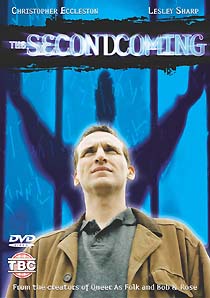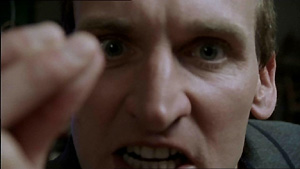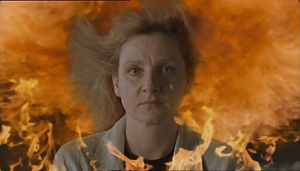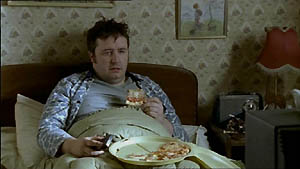
Note: This review was written a
couple of days before The Second Coming was originally transmitted.
|
THE SECOND
COMING
Director:
Adrian Shergold
Starring:
Christopher Eccleston, Lesley Sharp, Peter Armitage
After being missing
for forty days, a man reappears claiming to be the Son of God.
 British
mainstream drama is currently dominated by star vehicles for former soap
opera stars. Broadcasters are so driven now by the "appeal" of
these performers that it's almost unheard of for anything to be made that
doesn't star someone from Eastenders or Coronation Street.
Thus we are offered an endless procession of safe, predictable and
formulaic dramas. This makes Russell T. Davies' The Second Coming,
an intelligent ITV primetime drama, featuring actors cast solely for their
suitability for a particular role, a wholly remarkable achievement. The
series stars Christopher Eccleston as Steven Baxter, a man claiming to be
the Son of God, and Lesley Sharp as close friend Judith Roach. British
mainstream drama is currently dominated by star vehicles for former soap
opera stars. Broadcasters are so driven now by the "appeal" of
these performers that it's almost unheard of for anything to be made that
doesn't star someone from Eastenders or Coronation Street.
Thus we are offered an endless procession of safe, predictable and
formulaic dramas. This makes Russell T. Davies' The Second Coming,
an intelligent ITV primetime drama, featuring actors cast solely for their
suitability for a particular role, a wholly remarkable achievement. The
series stars Christopher Eccleston as Steven Baxter, a man claiming to be
the Son of God, and Lesley Sharp as close friend Judith Roach.
Writer Russell T. Davies already has a
remarkable track record, (including lesser-known early work, like the
memorable children's drama series Dark Season and Century Falls),
so it's not entirely surprising that The Second Coming is about as
far away from Heartbeat and Casualty as you could imagine,
given the restrictions of the current creative climate. If it can be
compared to anything, it would be the high concept, thought-provoking work
of Nigel Kneale (his 1979 Euston films version of Quatermass seems
a likely influence). Davies has already redefined the limits of
television drama, with Channel 4's groundbreaking drama series Queer as
Folk. The subsequent migration to ITV, where he created the more
conventional romantic comedy Bob and Rose, seemed to blunt his
ambition, although his gift for character was undiminished. Ironically The
Second Coming was originally commissioned by Channel 4, who eventually
dropped it after a change of management in the drama department. Instead The
Second Coming became ITV's most compelling drama series in recent
memory. Shame on Channel 4, and kudos to ITV, who showed real courage in
tackling such a controversial project.
Carlton's timely DVD release of The
Second Coming is a good example of how much things have changed in the
video industry in the last few years. Five years ago there would have been
very little chance that The Second Coming would have been released
at all. Very little drama used to be issued on video unless it had
generated sufficient critical mass over a long period (stuff like Inspector
Morse or A Touch of Frost), or had a nagging cult
following. Nowadays some video companies are generally more
pro-active, but releasing something like The Second Coming only a
week after its transmission, still requires - ahem - something of a leap
of faith.
 Carlton's
disc contains both episodes of the series, more or less as they will air
on ITV (the first episode ends with a "Next time..." trailer,
the second has a "Previously..." recap, for example). The
programme is presented in anamorphic widescreen format (with an aspect
ratio of 1.78:1), with 2.0 Dolby Digital stereo audio (at 192kbps).
Picture quality is generally excellent, and likely to be much better than
it would have appeared as a broadcast image (it's clear of the MPEG
encoding errors that routinely affect digital broadcasts, for example).
There's some graininess evident, but no more than you'd expected from
material sourced from Super 16mm film. The disc has optional English
subtitles. Carlton's
disc contains both episodes of the series, more or less as they will air
on ITV (the first episode ends with a "Next time..." trailer,
the second has a "Previously..." recap, for example). The
programme is presented in anamorphic widescreen format (with an aspect
ratio of 1.78:1), with 2.0 Dolby Digital stereo audio (at 192kbps).
Picture quality is generally excellent, and likely to be much better than
it would have appeared as a broadcast image (it's clear of the MPEG
encoding errors that routinely affect digital broadcasts, for example).
There's some graininess evident, but no more than you'd expected from
material sourced from Super 16mm film. The disc has optional English
subtitles.
Purists should note that the DVD
version has had some music substituted, since at least one song, the Mel
C track (Goin' Down), which accompanied a pivotal moment in the
second episode, wasn't
clearable for home video. It should also be noted that a heavily-edited
version of The Second Coming was prepared for broadcast in foreign
territories, which, among other things, lacks the coda from the UK
version.
 The
programme is accompanied by an interesting commentary track by Russell T.
Davies and Adrian Shergold, recorded on January 17th 2003, a couple of
weeks before transmission. The tone is light-hearted, but there's a lot of
useful information woven in, revealing many of the artistic choices that
were made during the four-year long development process (including some
things that were dictated by the budget or mere circumstance). They're
keen to avoid the mutual back-slapping that many commentary tracks fall
prey to, but do take the opportunity to praise some of the supporting cast
(including, quite rightly, Jennifer Hennessey, who delivers a remarkable,
spine-tingling performance as a TV news reporter). Many of the cast have
previously appeared in other series written by Davies or directed by
Shergold, including Denise Black (Queer as Folk), Mark Benton (Eureka
Street) and Annabelle Apsion (from the David Jason version of Micawber,
she also featured alongside Lesley Sharp in the Hughes Brothers' Jack the
Ripper movie From Hell). Davies and
Shergold also briefly speculate on what the public reaction to the series
might be, discuss a "happy ending" twist that was in an early
draft (which ITV liked, but which Davies eventually
decided to abandon), and even admit to some minor changes that they'd like
to make if only they still had the cast, crew and sets on tap. The
programme is accompanied by an interesting commentary track by Russell T.
Davies and Adrian Shergold, recorded on January 17th 2003, a couple of
weeks before transmission. The tone is light-hearted, but there's a lot of
useful information woven in, revealing many of the artistic choices that
were made during the four-year long development process (including some
things that were dictated by the budget or mere circumstance). They're
keen to avoid the mutual back-slapping that many commentary tracks fall
prey to, but do take the opportunity to praise some of the supporting cast
(including, quite rightly, Jennifer Hennessey, who delivers a remarkable,
spine-tingling performance as a TV news reporter). Many of the cast have
previously appeared in other series written by Davies or directed by
Shergold, including Denise Black (Queer as Folk), Mark Benton (Eureka
Street) and Annabelle Apsion (from the David Jason version of Micawber,
she also featured alongside Lesley Sharp in the Hughes Brothers' Jack the
Ripper movie From Hell). Davies and
Shergold also briefly speculate on what the public reaction to the series
might be, discuss a "happy ending" twist that was in an early
draft (which ITV liked, but which Davies eventually
decided to abandon), and even admit to some minor changes that they'd like
to make if only they still had the cast, crew and sets on tap.
 The
disc also contains an extensive selection of deleted scenes, totalling
about thirty-three minutes, presented letterboxed in non-anamorphic
format, in the low resolution format used during editing (AVID offline
material, for those who know what that is). The series was originally
structured as four one-hour (50m) episodes, and was eventually cut down to
two ninety-minute (72m) episodes, so it's not surprising that there was
quite a lot of material squeezed out. The deleted scenes include an
important character who was eventually written out (Frank's mother, whose
absence was explained in the broadcast version with a clever piece of
post-production dubbing). There's also a lengthy chunk that was cut from
the second episode, which sees the forces of darkness sowing dissent among
Stephen Baxter's followers. Some of the deleted scenes are mentioned
during the commentary, but others are only given context by the scene
numbers on the caption screens that separate the individual clips. This
section also includes a couple of scenes with unfinished special effects
(including a longer version of scene where the main character addresses a
crowd, which still has the green-screen backgrounds in place, for
example). For some reason this entire section seems to have two identical
audio tracks, which, if nothing else, is a waste of precious disc
space. The
disc also contains an extensive selection of deleted scenes, totalling
about thirty-three minutes, presented letterboxed in non-anamorphic
format, in the low resolution format used during editing (AVID offline
material, for those who know what that is). The series was originally
structured as four one-hour (50m) episodes, and was eventually cut down to
two ninety-minute (72m) episodes, so it's not surprising that there was
quite a lot of material squeezed out. The deleted scenes include an
important character who was eventually written out (Frank's mother, whose
absence was explained in the broadcast version with a clever piece of
post-production dubbing). There's also a lengthy chunk that was cut from
the second episode, which sees the forces of darkness sowing dissent among
Stephen Baxter's followers. Some of the deleted scenes are mentioned
during the commentary, but others are only given context by the scene
numbers on the caption screens that separate the individual clips. This
section also includes a couple of scenes with unfinished special effects
(including a longer version of scene where the main character addresses a
crowd, which still has the green-screen backgrounds in place, for
example). For some reason this entire section seems to have two identical
audio tracks, which, if nothing else, is a waste of precious disc
space.
Four minutes of outtakes are also
offered, which are best watched after watching the episodes themselves and
listening to the commentary track. |



 British
mainstream drama is currently dominated by star vehicles for former soap
opera stars. Broadcasters are so driven now by the "appeal" of
these performers that it's almost unheard of for anything to be made that
doesn't star someone from Eastenders or Coronation Street.
Thus we are offered an endless procession of safe, predictable and
formulaic dramas. This makes Russell T. Davies' The Second Coming,
an intelligent ITV primetime drama, featuring actors cast solely for their
suitability for a particular role, a wholly remarkable achievement. The
series stars Christopher Eccleston as Steven Baxter, a man claiming to be
the Son of God, and Lesley Sharp as close friend Judith Roach.
British
mainstream drama is currently dominated by star vehicles for former soap
opera stars. Broadcasters are so driven now by the "appeal" of
these performers that it's almost unheard of for anything to be made that
doesn't star someone from Eastenders or Coronation Street.
Thus we are offered an endless procession of safe, predictable and
formulaic dramas. This makes Russell T. Davies' The Second Coming,
an intelligent ITV primetime drama, featuring actors cast solely for their
suitability for a particular role, a wholly remarkable achievement. The
series stars Christopher Eccleston as Steven Baxter, a man claiming to be
the Son of God, and Lesley Sharp as close friend Judith Roach. Carlton's
disc contains both episodes of the series, more or less as they will air
on ITV (the first episode ends with a "Next time..." trailer,
the second has a "Previously..." recap, for example). The
programme is presented in anamorphic widescreen format (with an aspect
ratio of 1.78:1), with 2.0 Dolby Digital stereo audio (at 192kbps).
Picture quality is generally excellent, and likely to be much better than
it would have appeared as a broadcast image (it's clear of the MPEG
encoding errors that routinely affect digital broadcasts, for example).
There's some graininess evident, but no more than you'd expected from
material sourced from Super 16mm film. The disc has optional English
subtitles.
Carlton's
disc contains both episodes of the series, more or less as they will air
on ITV (the first episode ends with a "Next time..." trailer,
the second has a "Previously..." recap, for example). The
programme is presented in anamorphic widescreen format (with an aspect
ratio of 1.78:1), with 2.0 Dolby Digital stereo audio (at 192kbps).
Picture quality is generally excellent, and likely to be much better than
it would have appeared as a broadcast image (it's clear of the MPEG
encoding errors that routinely affect digital broadcasts, for example).
There's some graininess evident, but no more than you'd expected from
material sourced from Super 16mm film. The disc has optional English
subtitles. The
programme is accompanied by an interesting commentary track by Russell T.
Davies and Adrian Shergold, recorded on January 17th 2003, a couple of
weeks before transmission. The tone is light-hearted, but there's a lot of
useful information woven in, revealing many of the artistic choices that
were made during the four-year long development process (including some
things that were dictated by the budget or mere circumstance). They're
keen to avoid the mutual back-slapping that many commentary tracks fall
prey to, but do take the opportunity to praise some of the supporting cast
(including, quite rightly, Jennifer Hennessey, who delivers a remarkable,
spine-tingling performance as a TV news reporter). Many of the cast have
previously appeared in other series written by Davies or directed by
Shergold, including Denise Black (Queer as Folk), Mark Benton (Eureka
Street) and Annabelle Apsion (from the David Jason version of Micawber,
she also featured alongside Lesley Sharp in the Hughes Brothers' Jack the
Ripper movie
The
programme is accompanied by an interesting commentary track by Russell T.
Davies and Adrian Shergold, recorded on January 17th 2003, a couple of
weeks before transmission. The tone is light-hearted, but there's a lot of
useful information woven in, revealing many of the artistic choices that
were made during the four-year long development process (including some
things that were dictated by the budget or mere circumstance). They're
keen to avoid the mutual back-slapping that many commentary tracks fall
prey to, but do take the opportunity to praise some of the supporting cast
(including, quite rightly, Jennifer Hennessey, who delivers a remarkable,
spine-tingling performance as a TV news reporter). Many of the cast have
previously appeared in other series written by Davies or directed by
Shergold, including Denise Black (Queer as Folk), Mark Benton (Eureka
Street) and Annabelle Apsion (from the David Jason version of Micawber,
she also featured alongside Lesley Sharp in the Hughes Brothers' Jack the
Ripper movie  The
disc also contains an extensive selection of deleted scenes, totalling
about thirty-three minutes, presented letterboxed in non-anamorphic
format, in the low resolution format used during editing (AVID offline
material, for those who know what that is). The series was originally
structured as four one-hour (50m) episodes, and was eventually cut down to
two ninety-minute (72m) episodes, so it's not surprising that there was
quite a lot of material squeezed out. The deleted scenes include an
important character who was eventually written out (Frank's mother, whose
absence was explained in the broadcast version with a clever piece of
post-production dubbing). There's also a lengthy chunk that was cut from
the second episode, which sees the forces of darkness sowing dissent among
Stephen Baxter's followers. Some of the deleted scenes are mentioned
during the commentary, but others are only given context by the scene
numbers on the caption screens that separate the individual clips. This
section also includes a couple of scenes with unfinished special effects
(including a longer version of scene where the main character addresses a
crowd, which still has the green-screen backgrounds in place, for
example). For some reason this entire section seems to have two identical
audio tracks, which, if nothing else, is a waste of precious disc
space.
The
disc also contains an extensive selection of deleted scenes, totalling
about thirty-three minutes, presented letterboxed in non-anamorphic
format, in the low resolution format used during editing (AVID offline
material, for those who know what that is). The series was originally
structured as four one-hour (50m) episodes, and was eventually cut down to
two ninety-minute (72m) episodes, so it's not surprising that there was
quite a lot of material squeezed out. The deleted scenes include an
important character who was eventually written out (Frank's mother, whose
absence was explained in the broadcast version with a clever piece of
post-production dubbing). There's also a lengthy chunk that was cut from
the second episode, which sees the forces of darkness sowing dissent among
Stephen Baxter's followers. Some of the deleted scenes are mentioned
during the commentary, but others are only given context by the scene
numbers on the caption screens that separate the individual clips. This
section also includes a couple of scenes with unfinished special effects
(including a longer version of scene where the main character addresses a
crowd, which still has the green-screen backgrounds in place, for
example). For some reason this entire section seems to have two identical
audio tracks, which, if nothing else, is a waste of precious disc
space.